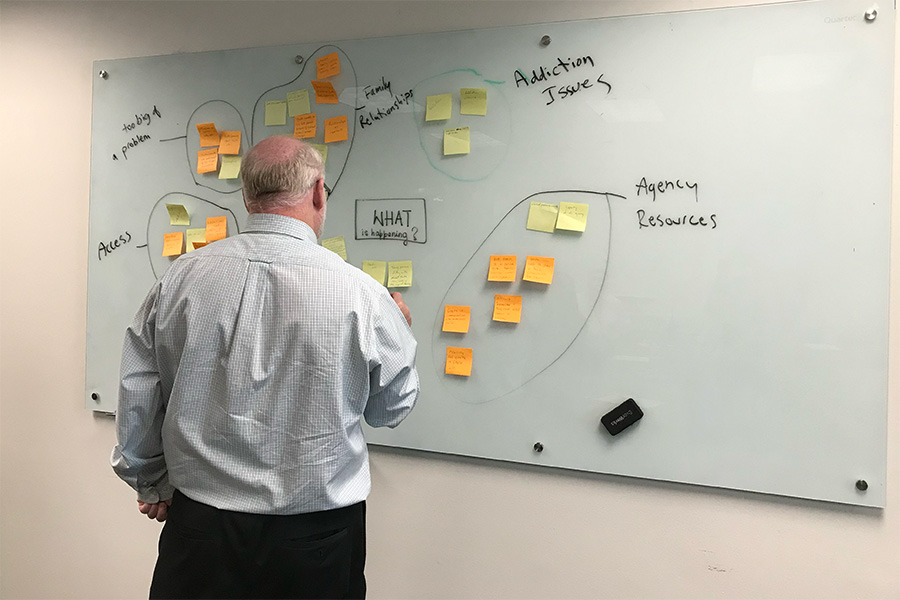Designing Change for the Future
CFA Alumna SL Rao is Creating Societal Change with a Focus on Youth
School of Design
written by
Pam Wigley
Pick up any technology magazine or admission booklet for colleges and universities, and chances are you’ll read about the intersection of technology and the arts. Shree Lakshmi Rao chooses, instead, to work at the intersection of technology and human beings. With those interests foremost in mind, Rao is making positive changes that affect our world.
With a lifelong interest in math and the arts, Rao pursued her bachelor’s degree in electrical, electronics and communications, earning her degree from Nitte Meenakshi Institute of Technology in her homeland, India. She also pursued theater on the side. That experience led her to investigate how humans interacted with technology on an emotional level. She combined her interests in her first job at a small art and robotics company and soon decided she wanted to work toward her master’s degree.
Carnegie Mellon University School of Design landed on her radar because its curriculum focused on deepening design practice while centering human behavior and needs. Rao saw that as an extension of her interests.
“At grad school at CMU, the blocks fell into place,” Rao said. “Working through and learning about the design process allowed me to see how I could combine my interests to solve problems for the things I saw around me in India.”
The changes Rao wanted to implement were twofold: Moving society toward more equitable outcomes and continuing to push and extend design and research methods to be applicable in the social sector.
To accomplish her goals, Rao spent a significant amount of time volunteering with different non-profit organizations and engaging in design-led projects locally in Seattle, a city she still calls “home” after completing a summer internship with Microsoft. She ran the local chapter of Interaction Design Association, worked on projects with non-profits such as Downtown Emergency Service Center.

After stints at The Robotics Institute at Carnegie Mellon and Microsoft, Rao worked as a Global Health Fellow at the Gates Foundation and as a strategist at the Washington State Department of Commerce. She began a role as principal service designer for Substantial, Inc. in 2021 and rose to her current job as VP of Design Research + Strategy in the Optimistic Design subdivision in December 2023. Optimistic Design is a design agency focused on equity centered design in the social sector.
While at the Department of Commerce, Rao co-created public policy with young people experiencing housing insecurity and with their caregivers to identify opportunities for prevention of youth homelessness. Through her efforts, many changes in the state’s youth homelessness system have been implemented. It’s gratifying, Rao said, to see the results of the work done by young people. But she didn’t stop there. Rao continued to mentor young people in the Seattle area through an organization called Community for Youth, also joining its board of directors in 2020.
Her clients include Bill and Melinda Gates Foundation and other non-profits and venture capitalist funds that focus on social impact or on improving outcomes for marginalized students in the education system. Rao said she’s “in a good place now, building strong talent” within her team. And, despite a full schedule, she still finds time to share her expertise through volunteering.
Rao joined the CFA Dean’s Council in 2023 after meeting with senior director of CFA Advancement, Rebecca Abrams, and Dean Mary Ellen Poole and realized she could contribute her talents of driving change toward her alma mater’s mission and goals. Part of her work within CFA is dedicated to supporting current students.
“I want students who want to bring their skills to the social impact space to know that they should be thoughtful about how they approach the work,” Rao said. “I want them to recognize themselves more as facilitators and fellow learners rather than experts. As researchers and designers, we have to critically examine our existing biases and perspectives because they seep into the research and design we do. We need to support and shift power to the folks already doing the work and those with lived experiences.
“As designers and researchers, we need to be conscious about who we are and what we bring into the work that we do in the community so that we don’t amplify existing systems of harm,” she said.
“I want to connect society’s dots in a way that leads to effective actions with real meaning.”
SL Rao
featuring the following:
photography courtesy of SL Rao